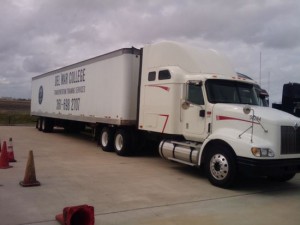South Texas has had a huge CDL driver shortage even before Eagle Ford Shale. Currently there are 150,000 CDL drivers needed nationwide. The American Trucking Associations have predicted the driver shortage will jump to 300,000 by the year 2014. Many companies are finding it more and more challenging to attract experienced CDL drivers due to the huge demand. CDL holders are held to a much higher standard than regular licensed drivers and must keep their driving records in good standing.
Hiring good experienced drivers is very challenging because companies have to be especially strict about driving records, accidents and Department of Transportation violations. This is because of CSA (Compliance, Safety, Accountability) scores. CSA was established to keep accurate statistics of accidents, DOT violations, unsafe equipment and driving habits. CSA scores the safety performance of both the driver and the driver’s company. If a driver receives an unsatisfactory vehicle inspection and receives a violation, it will stay on the individual’s CSA score for three years and the company that employed the driver at the time for two years. Under CSA’s new system that score will travel with the driver to whatever company the driver may transfer to over those three years. Having a negative CSA score increases the chance of receiving a DOT audit and can be very costly to both the driver and the employer.
South Texas CDL Training Programs Need to Utilized
Many companies have resorted to hiring inexperienced drivers to try and keep up with the workload. Inexperienced drivers could be a high risk if they did not receive adequate training from a credible CDL training program that teaches them how to be a safe, law abiding driver. Unfortunately there are some instances where a company will offer to train inexperienced drivers. In many cases these individuals are not successful because they are taught only how to pass the CDL test given at their local Department of Public Safety. However, there’s more to know to be able to drive a truck safely and efficiently. For example, drivers must know hours-of-service regulations and have to maintain a log book. Since hours of service isn’t tested it’s a subject that’s rarely taught in a CDL-prep-only program, but it’s vital to being able to operate a heavy commercial motor vehicle safely and legally.
Drivers must follow many federal and state rules and regulations which undergo frequent updating and changes. Not understanding their responsibilities can ruin drivers’ CSA scores quickly making them unemployable. Transport companies are in the business of transporting items; they’re not educators. Schools and training programs specialize in and have the experience and tools to give people a thorough education consistent with current industry and government requirements. [ic-c]
How to Choose a CDL Training Program
When researching a credible CDL training program to attend here are a few things to watch out for:
- Is the training program approved though your state or is it a crash course?
- Does the program offer classroom training that teaches the State and Federal Safety Regulations?
- Does the training curriculum include hours of service and vehicle inspection practices?
- How much time is offered behind the wheel for backing and road driving?
- After completing the training, what companies will hire their students and do graduates receive a training certificate?
Good training is an investment that lasts for a lifetime of safe and rewarding driving. Professional drivers get the best and most thorough training they can. They understand that they owe it to themselves, their employers and the people with whom they share the road.

